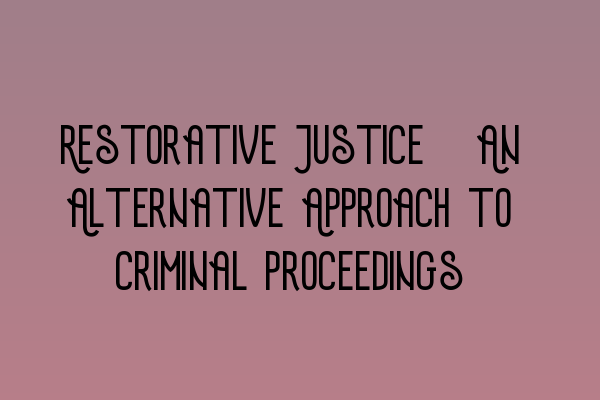Restorative Justice: An Alternative Approach to Criminal Proceedings
Criminal proceedings are a crucial aspect of our legal system, aiming to hold individuals accountable for their actions and provide justice to the victims. Traditionally, these proceedings focus on punishment and deterrence, often leaving little room for rehabilitation or repairing the harm caused. However, there is an alternative approach gaining traction in recent years – restorative justice.
What is Restorative Justice?
Restorative justice is a victim-centered approach that seeks to bring together the offender, victim, and the community to address the harm caused by the crime. It focuses on repairing the harm, promoting accountability, and supporting the healing and reintegration of all parties involved.
Unlike the traditional criminal justice system, which emphasizes punishment, restorative justice aims to facilitate dialogue, understanding, and empathy. It recognizes that crime not only affects individuals directly involved but also the wider community. By involving all stakeholders, restorative justice aims to reduce recidivism rates and promote a sense of healing and closure.
The Principles of Restorative Justice
Restorative justice is underpinned by several key principles:
- Inclusion: Restorative justice actively involves all affected parties, including the offender, victim, and community members.
- Voluntariness: Participation in restorative justice processes is voluntary and requires the consent of all involved parties.
- Empowerment: Restorative justice empowers victims by giving them a voice and a chance to express their feelings, needs, and expectations.
- Accountability: Offenders take responsibility for their actions and have the opportunity to make amends to the victim and the community.
- Reparation: Restorative justice focuses on repairing the harm caused by the crime, both tangible and intangible, through dialogue, restitution, and community service.
- Transformation: The ultimate goal of restorative justice is to transform the relationships between the victim, offender, and community, promoting healing, understanding, and mutual support.
The Benefits of Restorative Justice
Restorative justice offers several advantages over traditional criminal proceedings:
- Victim Satisfaction: By actively involving victims in the process, restorative justice provides them with a sense of validation, closure, and satisfaction.
- Reduced Recidivism: Studies have shown that restorative justice programs can significantly reduce reoffending rates compared to punitive approaches.
- Community Healing: Restorative justice fosters a sense of community involvement, empathy, and healing, helping to restore trust and harmony.
- Emotional Rehabilitation: Both victims and offenders have the opportunity to address the emotional impact of the crime and work towards personal healing.
- Cost-Effectiveness: Restorative justice programs are often more cost-effective than traditional criminal proceedings, reducing the burden on the justice system.
Implementing restorative justice requires collaboration between legal professionals, policymakers, and the community. By understanding the principles and benefits of restorative justice, aspiring solicitors can enrich their knowledge of alternative approaches to criminal proceedings, ensuring they are well-prepared for the SQE exams.
For more information on the SQE exams and essential study materials, check out our related article: SQE Exam Prep: Essential Study Materials for Aspiring Solicitors.
Expert testimonies play a vital role in building strong cases. To learn more about the importance of expert testimonies in UK courts, read our article: Expert Testimonies in UK Courts: Building Strong Cases.
Understanding the format of the SQE exams is crucial for success. Demystify the Solicitors Qualifying Examination format by reading our article: Demystifying the Solicitors Qualifying Examination Format.
International lawyers facing the SQE exams may encounter unique challenges. Gain insights into overcoming these challenges and developing success strategies with our article: SQE Exam for International Lawyers: Challenges and Success Strategies.
If you’re an entrepreneur in the UK, understanding the process of LLC formation is crucial. Check out our step-by-step guide: LLC Formation Made Simple: Step-by-Step Guide for UK Entrepreneurs.
Restorative justice offers a promising alternative to the traditional criminal justice system. By embracing this approach, we can work towards a more compassionate, inclusive, and effective legal system that brings healing and justice to all parties involved.
